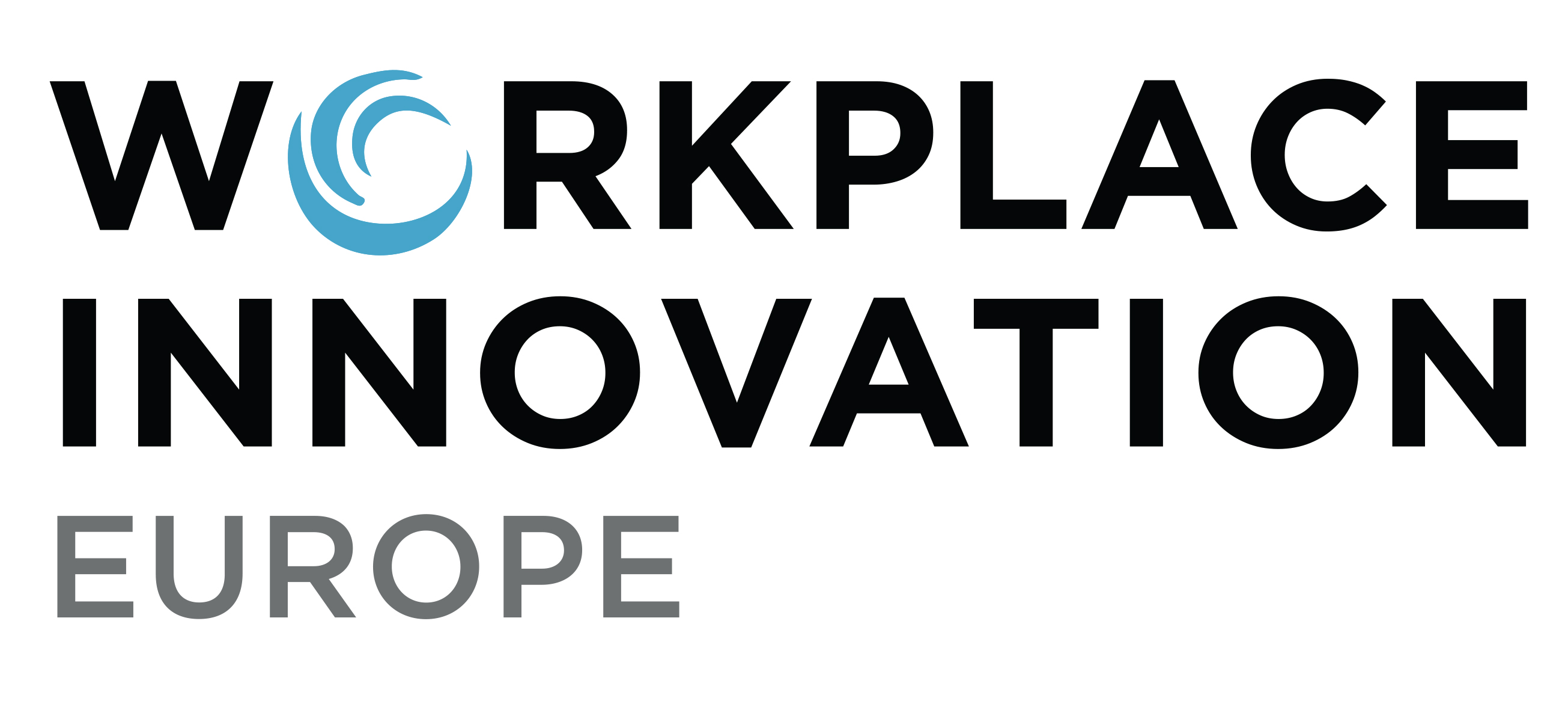Evidence into practice
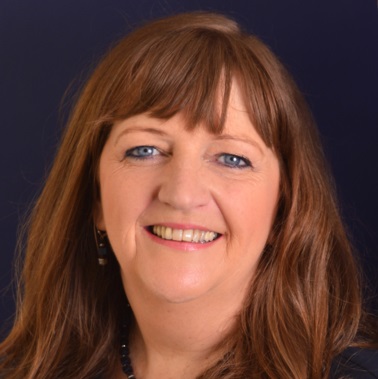
Rosemary Exton
Director
Workplace Innovation Europe CLG
The evidence has been around for a long time. Multi-Disciplinary Teamworking in healthcare leads to better clinical outcomes and experience for patients, and better quality of working life for staff.
Yet it is far from universal. Multi-Disciplinary Teamworking challenges traditional professional roles and demarcations, and can be hard to achieve. While the general principles that characterise good clinical teams are well understood, their translation into specific clinical settings involves open dialogue, experimentation, learning from failure, and persistence. All of this must take place without any relaxation of day-to-day clinical pressures.
This case study offers practitioners fresh insights into how Multi-Disciplinary Teamwork principles can be translated into practice. It is based on an eighteen month change programme led by Workplace Innovation in partnership with Southern Health and Social Care Trust in Northern Ireland.
The programme was led by Workplace Innovation’s Rosemary Exton, a highly experienced change facilitator with an extensive background in the NHS and knowledge of hospital practice in several parts of Europe.
The Workplace Innovation team was supported by the Workage project, an initiative funded under the EU’s PROGRESS programme. Views expressed in this report are not necessarily shared by Southern Health and Social Care Trust, the European Commission or other Workage partners.
Putting Multi-Disciplinary Teamwork Principles into Practice
Working closely with a broad cross-section of consultants, doctors, midwives, midwifery support workers (MSWs), managers, administrators, domestic staff and other professional groups, we helped the Maternity Service translate the widely accepted principles of Multi-Disciplinary Teamworking into an approach which reflects its specific local and clinical context:
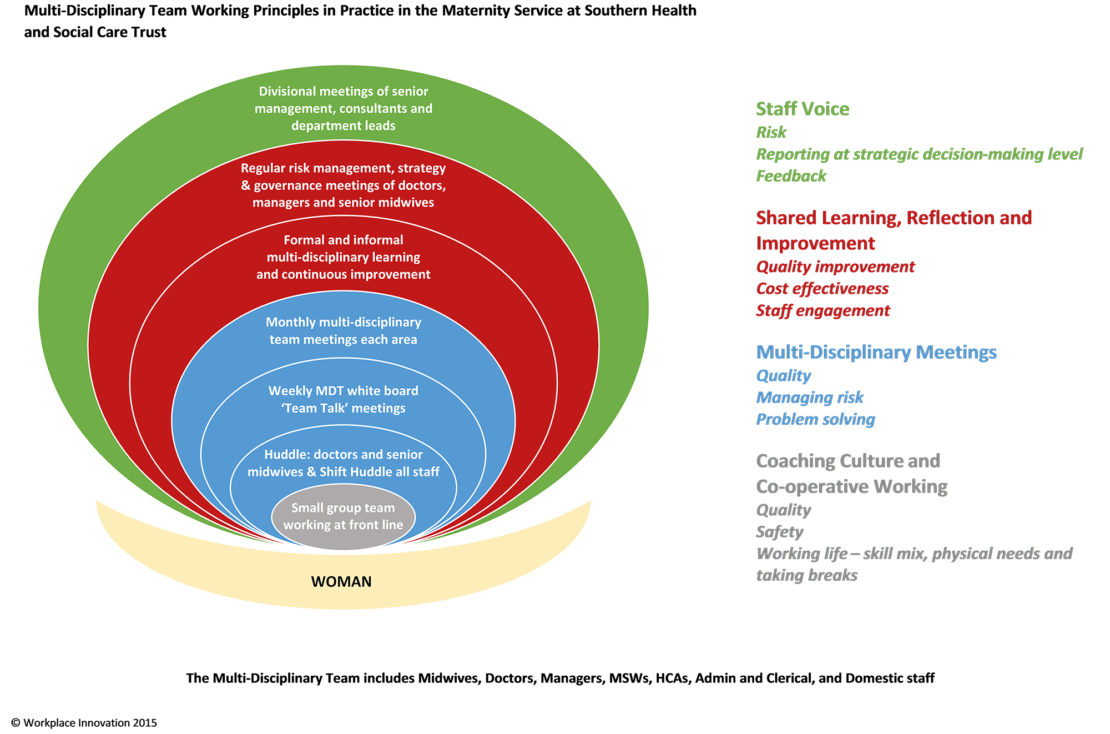
Small group teamworking at the frontline
Small group teamworking involves between two and five midwives allocated to work together in mutual support including knowledge sharing, debriefing and practical help such as the provision of cover for breaks. Groups reflect an appropriate mix of skills, experience and physical (or age-related) ability.
Shift Huddle
Each area and ward in the Maternity Department involves all staff at the start of every shift in ‘Shift Huddles’ to improve communication and to support allocation to the small group teams. Ideas raised at the Shift Huddle are put on the White Board to be discussed at the Team Talk meeting (see below).
Unit Huddle
This was suggested by a consultant in the Daisy Hill MDT Group. Doctors and senior midwives from the obstetric, midwifery and neonatal teams meet each day to enhance communication, addressing workload pressures and improving patient flow and quality of care throughout the maternity service. In a 5 or 10-minute meeting, all the clinical areas pool information, complete a (red, amber, green) risk assessment form and share awareness of pressing issues. To encourage their professional development, Band 6 midwives are supported to attend whenever staffing levels allow.
Weekly White Board Team Talk Meetings
Everyone in the multi-disciplinary team (including domestic and admin/clerical staff) contributes by adding ideas or suggestions to the ward or department White Board, and by participating in the Team Talk meetings. All available staff gather around the White Board each week to discuss its contents. The discussion is recorded and actions (with the names of those responsible) are noted in the Communication Book, accessible to all staff. Agreed actions are followed up at the subsequent weekly Team Talk meeting and taken to the next Monthly Team Meeting (see below) where appropriate.
Small group teamworking at the frontline
Small group teamworking involves between two and five midwives allocated to work together in mutual support including knowledge sharing, debriefing and practical help such as the provision of cover for breaks. Groups reflect an appropriate mix of skills, experience and physical (or age-related) ability.
Shift Huddle
Each area and ward in the Maternity Department involves all staff at the start of every shift in ‘Shift Huddles’ to improve communication and to support allocation to the small group teams. Ideas raised at the Shift Huddle are put on the White Board to be discussed at the Team Talk meeting (see below).
Unit Huddle
This was suggested by a consultant in the Daisy Hill MDT Group. Doctors and senior midwives from the obstetric, midwifery and neonatal teams meet each day to enhance communication, addressing workload pressures and improving patient flow and quality of care throughout the maternity service. In a 5 or 10-minute meeting, all the clinical areas pool information, complete a (red, amber, green) risk assessment form and share awareness of pressing issues. To encourage their professional development, Band 6 midwives are supported to attend whenever staffing levels allow.
Weekly White Board Team Talk Meetings
Everyone in the multi-disciplinary team (including domestic and admin/clerical staff) contributes by adding ideas or suggestions to the ward or department White Board, and by participating in the Team Talk meetings. All available staff gather around the White Board each week to discuss its contents. The discussion is recorded and actions (with the names of those responsible) are noted in the Communication Book, accessible to all staff. Agreed actions are followed up at the subsequent weekly Team Talk meeting and taken to the next Monthly Team Meeting (see below) where appropriate.
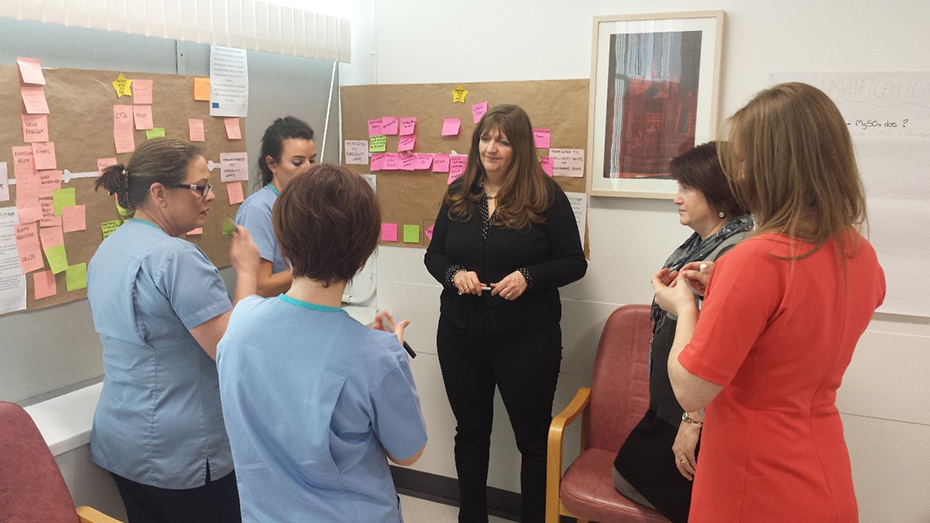
Rosemary (centre) leads a process mapping exercise at Craigavon with Patricia and Jeni (right)
Monthly Multi-Disciplinary Team Meetings
Monthly meetings provide an important opportunity for shared learning from incidents, the generation of ideas for improvement, and discussion of forthcoming issues. Midwives are allocated on the duty roster to ensure high levels of participation at the monthly meetings. Ideas and suggestions are sent to the Divisional Meeting (see below) where senior level action is needed; feedback from Divisional Meetings is received by the Monthly Multi-Disciplinary Team Meetings and entered in the Communication Book available to all staff.
Multi-Disciplinary Learning, Training and Continuous Improvement
The two MDT Groups were initially envisaged as a short-term measure to drive the transition towards multi-disciplinary working. By mid-2016 they had evolved into Maternity Continuous Improvement Groups, providing a continuing forum for staff-led initiatives. In addition, a comprehensive programme of multi-disciplinary learning and training sessions was developed and is communicated to all staff to maximise participation.
Strategy, Clinical Governance and Risk Management
Regular meetings of doctors, managers and senior midwives draw on issues raised in the various multi-disciplinary forums described above. Risky Business open sessions are also held, facilitated by the Risk Midwife; all staff are invited to discuss risk issues or near-miss events in a ‘no blame’ environment.
Divisional Meetings
Senior managers, consultants and departmental leads meet monthly to address strategy and governance. Previously seen as remote from the clinical frontline, these meetings rarely secured participation from midwives in the past. They are now more inclusive and aim to ensure that strategic decisions involve two-way communication with frontline teams, both directly and through the chain described above.
Embedding Multi-Disciplinary Teamworking
The MDT structure described above reinvents generic teamwork principles to reflect local and clinical circumstances. It grew from dialogue, inclusion and experimentation, albeit in an environment where certain structural and behavioural factors acted as significant constraints.
The transformation of healthcare toward Multi-Disciplinary Teamworking challenges professional self-identities, power distribution and gender relationships. It involves extended periods of shared learning and the re-evaluation of assumptions held by co-working professionals.
Recent feedback shows that that many of the gains associated with Multi-Disciplinary Teamworking in the literature are now being realised in Southern Trust’s Maternity Service. As a final endorsement, the Directors of Nursing and Medicine have adopted the MDT approach developed by the Workplace Innovation team and staff in the maternity service as a template for improvement and innovation across every clinical service in the Trust.
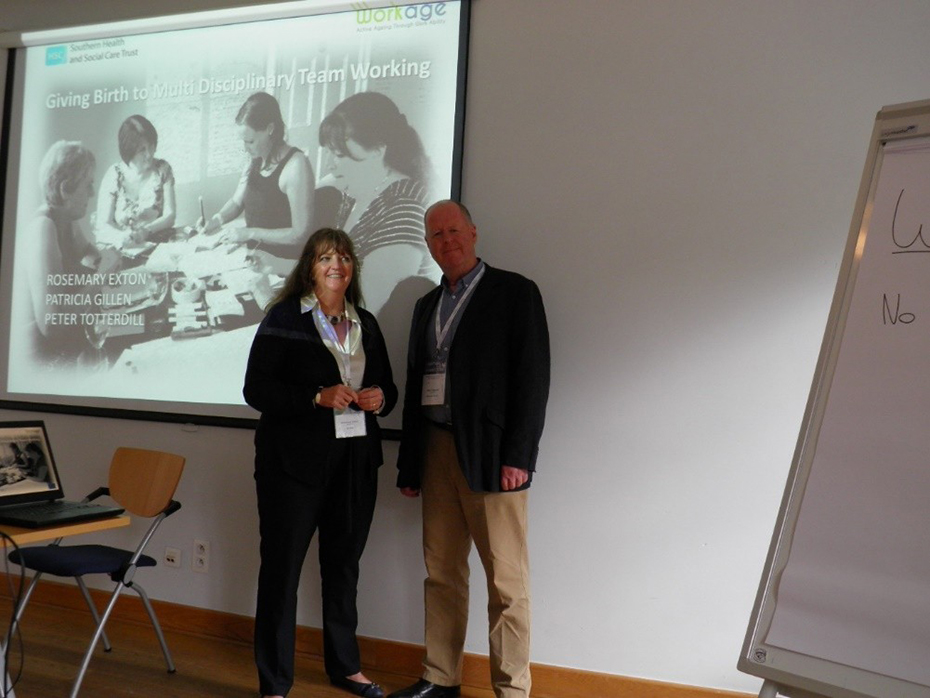
Rosemary and Peter presenting their experiences at Southern Trust to the 2015 IWOT Conference in Leuven
Resources
